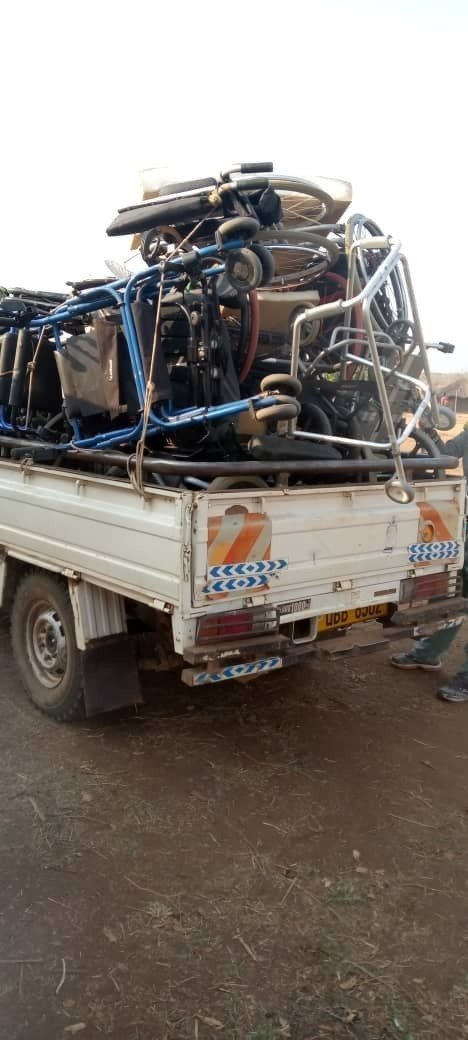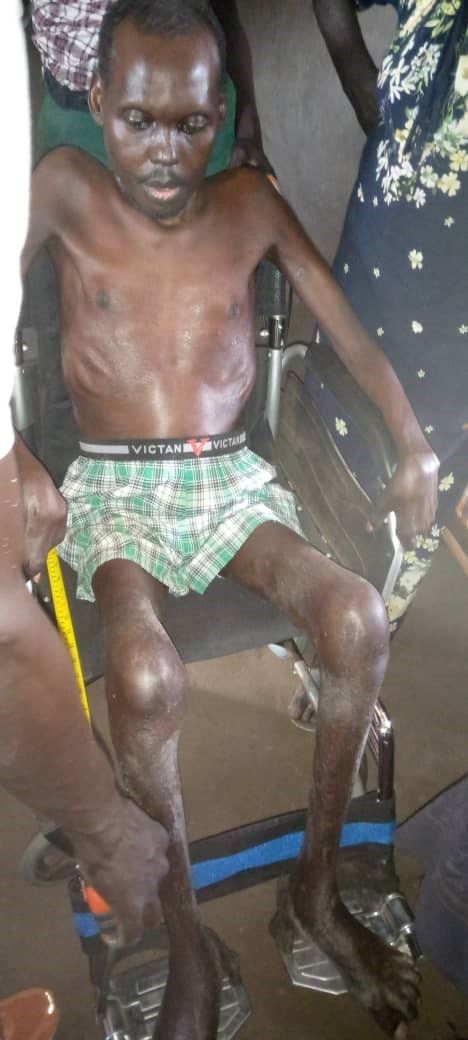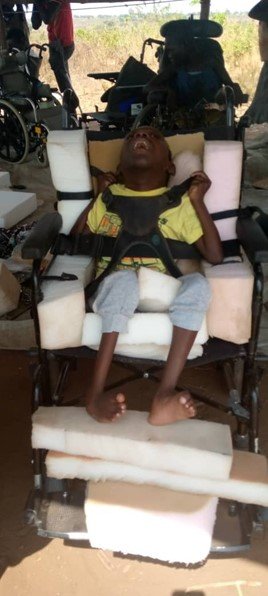Week 6: Wheels for the World in Uganda 2021 - Supported Distribution
Supported Distribution to the Bidi Bid Refugee Camp, N.W. Uganda
Wheels Blog Week 6 (8th and 9th March 2021)
 It’s been another busy week for the TTR team assisting Hope Health Action (HHA) out in Bidi Bidi, Uganda. Each day the HHA team load up their pick-up truck and head off to the area of the vast camp that they are working in that day. This can take an hour or more as they travel over the murram (dirt) roads leaving clouds of dust behind them.
It’s been another busy week for the TTR team assisting Hope Health Action (HHA) out in Bidi Bidi, Uganda. Each day the HHA team load up their pick-up truck and head off to the area of the vast camp that they are working in that day. This can take an hour or more as they travel over the murram (dirt) roads leaving clouds of dust behind them.
At this stage of any distribution, there are shortages of certain pieces of equipment and sizes of wheelchairs, so wisdom is needed about what to take and what would be most suitable for the people the team intends to see.
This week we saw fewer clients – a total of 16 over the two days. Part of the reason for this is that some people were not able to attend the distribution site because of illness, but this week in particular the HHA team went out to visit people in more remote areas who would otherwise not be able to get help. It takes time travelling between each area as some of the team will recall from their visit in 2019, travelling for an hour or more, then selecting the equipment they need before walking from a road through crops to remote compounds where people live in reed roofed mud huts.
As with previous weeks the people helped ranged from children through to the elderly, several who have contracted polio or TB; illnesses now unknown in the West. Then there were cases of cerebral palsy and dislocated hips, amputations, accidents and general weakness due to old age, each of which were handled sensitively by the teams here in the UK and in Uganda.
The Monday afternoon TTR team were the ones who assisted the HHA team on the home visits and reported that, ’After losing internet connection during the initial afternoon prayer time at the base, the team continued to pray, giving thanks for the work completed in the morning and for logistics, blessings and protection as the HHA team travelled for around an hour to reach the clients who were unable reach the distribution centre themselves.’
They went on to say, ’In the UK, it can be easy to take for granted how quick and easy it is to access your local community or any services you need’. They waited in anticipation to see if the internet would hold and who they would see. This was an interesting international extension to what some of the UK based community therapists working during the pandemic were already doing - a virtual home visit from their sitting room!
They saw two clients. First there was 70 year old Jane, a mother of five children who had had a stroke affecting her left side. She left South Sudan in 2016 after her husband died in the war and has been living with her daughter in the camp. Her three sons abandoned her and stayed behind in South Sudan. She was given a crutch to help her with mobility around the home and compound as well as a wheelchair so her daughter can push her longer distances to the hospital or church.
 Then there was a second pause as the UK team waited for HHA to get to the next home, find it and wait for the internet to connect, which by now HHA described as 'not stable'. They persisted with WhatsApp texts and photos as far as possible, which worked better than the UK team were anticipating at the start of the shift. Fifty two year old Rufas, couldn't walk, has TB and is in severe pain. He hadn't had a wheelchair before and had spent a lot of time lying on the floor so was at risk of developing pressure sores. Unfortunately, due to the location of the visit and low supplies as we near the end of the distribution, a specialist pressure relief cushion wasn't available. The HHA team worked hard to make up for this by adapting the wheelchair at the family home to make it comfortable. This involved making thicker seat cushions, providing a backrest cushion and padding the wheelchair arms. Advice was also given around changing between sitting and lying positions regularly including using the wheelchair cushions to lie on. A delight at the end of the day was when the team were able to connect with a video call at Rufas' home to give thanks for all HHA had achieved that afternoon.
Then there was a second pause as the UK team waited for HHA to get to the next home, find it and wait for the internet to connect, which by now HHA described as 'not stable'. They persisted with WhatsApp texts and photos as far as possible, which worked better than the UK team were anticipating at the start of the shift. Fifty two year old Rufas, couldn't walk, has TB and is in severe pain. He hadn't had a wheelchair before and had spent a lot of time lying on the floor so was at risk of developing pressure sores. Unfortunately, due to the location of the visit and low supplies as we near the end of the distribution, a specialist pressure relief cushion wasn't available. The HHA team worked hard to make up for this by adapting the wheelchair at the family home to make it comfortable. This involved making thicker seat cushions, providing a backrest cushion and padding the wheelchair arms. Advice was also given around changing between sitting and lying positions regularly including using the wheelchair cushions to lie on. A delight at the end of the day was when the team were able to connect with a video call at Rufas' home to give thanks for all HHA had achieved that afternoon.
 The team also had challenges with complex cases of children trying to adapt the available equipment and giving advice on sleeping positions to prevent further damage to their frail frames. This is 6 year old Mungia who was first seen by the Tuesday morning team. He has cerebral palsy and cannot control his head movement He also has fixed arm positions and a rotated hip causing a dislocation of his femur. The team thought that a special reclining chair would be suitable but after a while we were told his mother would not be able to use the heavy chair and so a normal chair was adapted. This case took a long time and was the handed over to the afternoon team who completed the fitting, suggesting a harness to stop him falling forward and a strap to support his feet instead of the foam that the HHA team had put on the footplates. The special chair was later used by the afternoon team for an 18 year old client, also with the cerebral palsy, so it was not taken back to the store.
The team also had challenges with complex cases of children trying to adapt the available equipment and giving advice on sleeping positions to prevent further damage to their frail frames. This is 6 year old Mungia who was first seen by the Tuesday morning team. He has cerebral palsy and cannot control his head movement He also has fixed arm positions and a rotated hip causing a dislocation of his femur. The team thought that a special reclining chair would be suitable but after a while we were told his mother would not be able to use the heavy chair and so a normal chair was adapted. This case took a long time and was the handed over to the afternoon team who completed the fitting, suggesting a harness to stop him falling forward and a strap to support his feet instead of the foam that the HHA team had put on the footplates. The special chair was later used by the afternoon team for an 18 year old client, also with the cerebral palsy, so it was not taken back to the store.
This week we commenced the use of a Client Assessment form which the UK team had devised. The HHA team to complete, photograph and send to the session therapist and techie which reduces the questions the UK team need to ask. This seemed to work and, looking to the future, we may be recommending its use in any future supported distributions.

